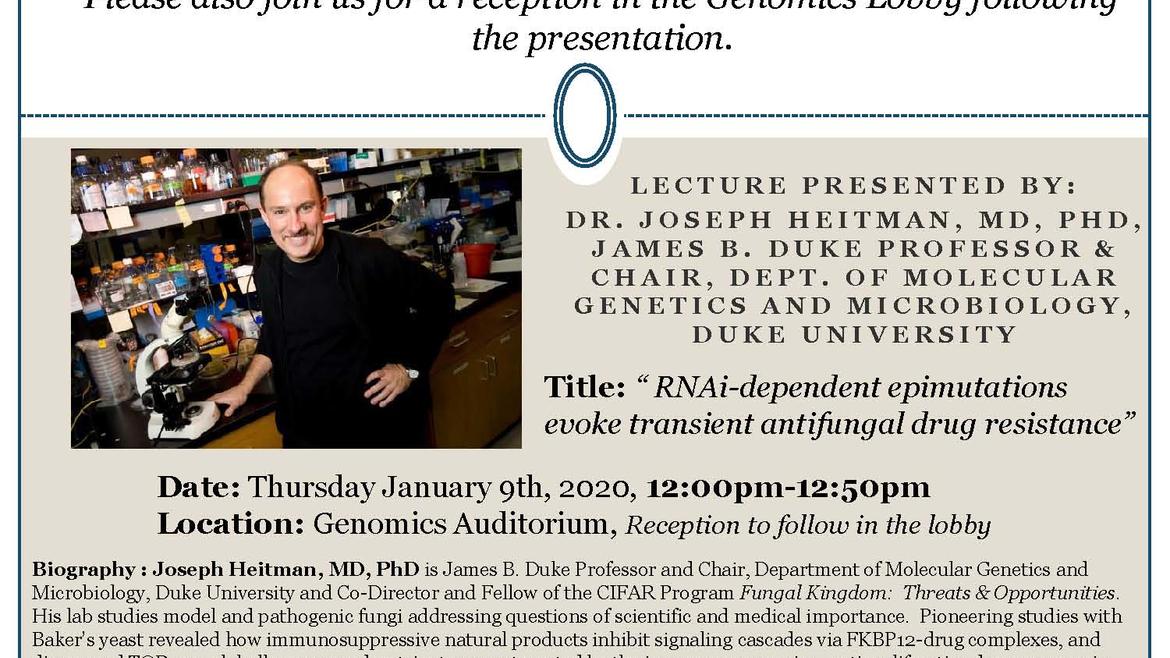
Microbiology and Plant Pathology Awards Ceremony and Graduate Student Invited Lectureship
Lectureship: 12:00-12:50pm
Awards Presentation: 1:00-1:20pm
Reception: 1:30-3:00pm
Lectureship presented by:
Dr. Joseph Heitman, MD, PhD, James B. Duke Professor, & Chair, Department of Molecular Genetics and Microbiology, Duke University
Lecture Title: "RNAi-dependent epimutations evoke transient antifungal drug resistance"
Abstract:
Microorganisms evolve via sexual/parasexual reproduction, mutators, aneuploidy, Hsp90, or prions. Mechanisms that are detrimental can be repurposed to generate diversity. Microbes are known to evolve resistance to antimicrobial agents via pathways involving both stable and unstable genetic mechanisms, such as aneuploidy underlying azole resistance in Candida albicans and Cryptococcus neoformans. We discovered a new mechanism conferring antifungal drug resistance in the human fungal pathogen Mucor circinelloides. Spontaneous resistance to the antifungal drug FK506 was found to evolve via two distinct mechanisms. One involves Mendelian mutations conferring stable irreversible drug resistance; the other occurs via an epigenetic RNA interference (RNAi)-mediated pathway resulting in unstable, transient drug resistance. The peptidyl-prolyl isomerase FKBP12 interacts with FK506 forming a complex that inhibits the protein phosphatase calcineurin. Calcineurin inhibition by FK506 blocks M. circinelloides dimorphic transition to hyphae and enforces growth as yeasts. In some FK506 resistant isolates, mutations in the fkbA gene encoding FKBP12 or the calcineurin cnbR or cnaA genes confer FK506 resistance and restore hyphal growth. In other resistant isolates, no mutations are found in the known drug targets. Instead, RNAi has been triggered to silence the fkbA gene, yielding drug-resistant epimutants. FK506-resistant epimutants readily revert to drug-sensitivity in the absence of FK506. The establishment of epimutants is accompanied by generation of abundant fkbA small RNAs and requires some known RNAi pathway components whereas others are dispensable. Surprisingly, epimutants occur at a higher frequency and are more stable in mutants lacking RNA-dependent RNA polymerase 1 or 3 (Rdrp1/3) or the RNaseIII-like protein R3B2, revealing some RNAi components inhibit epimutation. Silencing of the drug target FKBP12 appears to involve generation of a double-stranded RNA trigger intermediate using the fkbA mature mRNA as template to produce antisense fkbA RNA. These findings have been generalized to show epimutations occur in a second species of Mucor, and identifying epimutations in the pyrF or pyrG genes conferring 5-fluoroorotic acid (5-FOA) resistance. Studies in murine models address the stability/instability of epimutations during infection, and reveal infection related stress can induce epimutation and drug resistance.
These studies uncover a novel, reversible, transient epigenetic RNAi-based epimutation mechanism controlling phenotypic plasticity, with implications for antimicrobial drug resistance, in vivo mechanisms of pathogenesis, and RNAi-regulatory mechanisms in fungi and other eukaryotes. The full impact of epimutations in this and other genetic systems (including fungal pathogens of humans, fungal pathogens of plants, and oomycete pathogens of plants) may have eluded discovery previously given their inherently unstable nature.
To RSVP for this event please contact Maggie Flores at margarita.flores@ucr.edu.